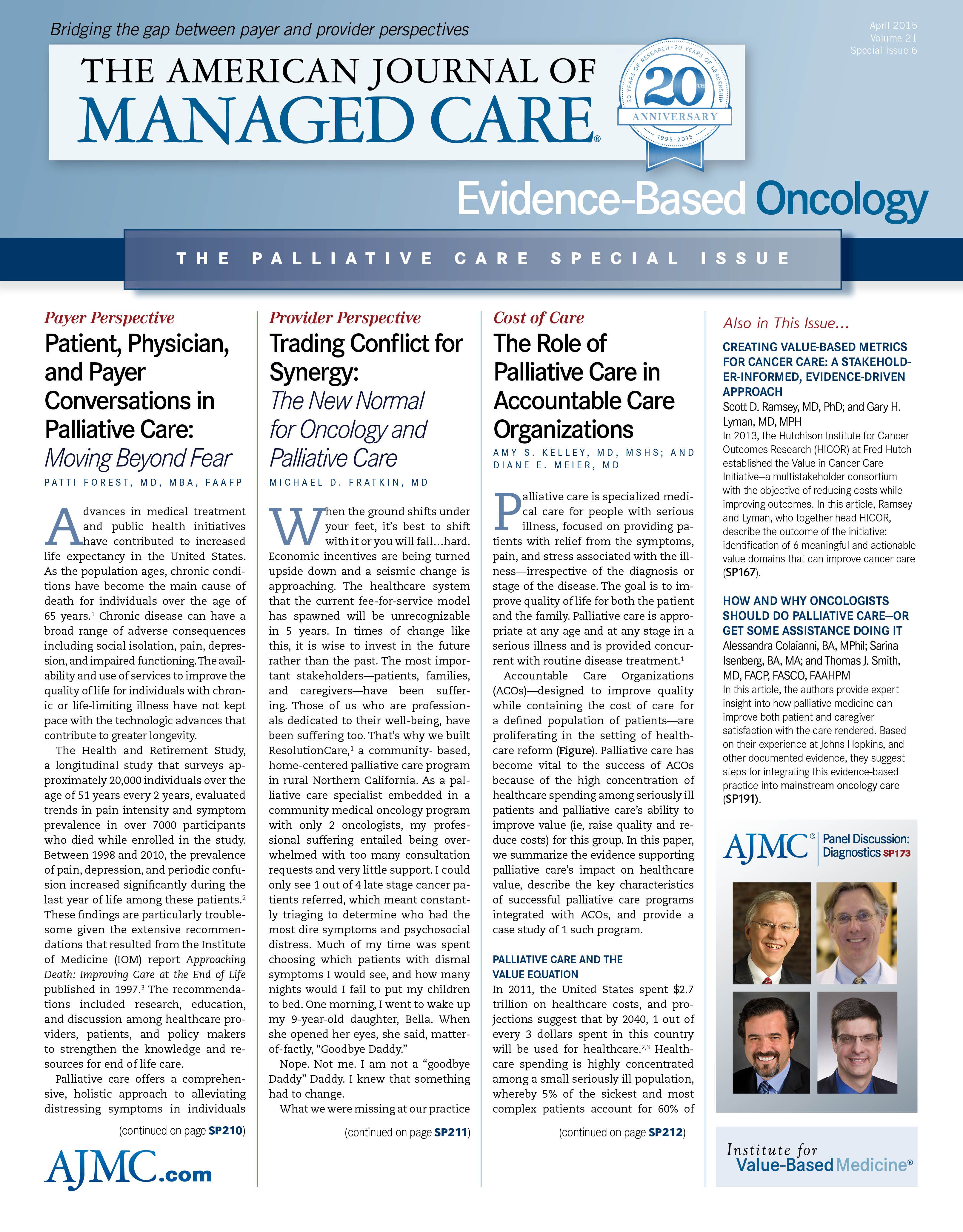- Center on Health Equity & Access
- Clinical
- Health Care Cost
- Health Care Delivery
- Insurance
- Policy
- Technology
- Value-Based Care
Q&A on Palliative Care
Randall Krakauer, MD, vice president and national medical director for Medical Strategy at Aetna, who helped design Aetna’s Compassionate Care Program (ACCP) that was launched in 2004, says that its consistent success illustrates why palliative care should become the standard of care for many of the sickest patients.
Q:
WHO IS ELIGIBLE FOR THE PROGRAM?
A:
ACCP focuses on patients with advanced illness, which refers to a medical condition that has progressed to the point that therapy designed to substantially reverse the pathological process is no longer effective or appropriate. Almost 50% of participants in ACCP have cancer. Others have a variety of conditions including heart disease, kidney disease, lung disease, and, most frequently, a combination of conditions. For these patients, decision support, psychosocial support, pain relief, palliative care, and related services are the most appropriate approach.
Q:
HOW MANY AETNA MEMBERS USE THE PROGRAM AT ANY GIVEN TIME?A: We are engaging a little less than 1% of the 600,000 people in our Medicare population, and we also provide the service for our commercially insured population. The percentage of people with advanced illness in our commercial population is much smaller than it is in the Medicare population. Still, given the overall size of the population, we serve several hundred commercial patients a year.
Q: HOW DOES THE PROGRAM WORK?
A:
We identify eligible members with advanced illness through various means, including an algorithm that analyzes claims and transactions, self-referrals, and physician referrals. We reach out to these members and offer advice, assistance, and support from case managers. Most of the case managers are nurses, though some are social workers. They receive special training and mentoring in advanced illness and palliative care issues and frequently help members and their families address concerns that may be dif cult to face. Most of them have considerable experience. They connect not only with individual patients but also with their physicians, families, caregivers, and others. They provide decision support on care options including hospice. They provide psychosocial support. They facilitate pain relief. They provide links to social service agencies where necessary or appropriate.
Q: WHEN DID AETNA LAUNCH THE PROGRAM?
A:
ACCP was launched almost 10 years ago, after we had built a robust case management capability for our Medicare population. We identi ed advanced illness as an area where these case managers could add signi cant support and value. We recognized that the default choices for treatment and end-of- life care in the healthcare system did not reasonably represent informed decision-making—patients who got the appropriate information and assistance would often make other decisions.
Q: HOW BIG AN IMPACT HAS THE PROGRAM HAD ON PATIENTS?
A:
Every metric we monitor indicates extraordinarily favorable impact in health outcomes and satisfaction. My favorite illustration of this is the remarkable fact that we have run this program for nearly a decade and we have not received a single member complaint. On the health outcomes side, the program dramatically changes how our members use medical services. Among our engaged Medicare population, there has been an 82% reduction in acute hospital days, an 86% reduction in intensive care days, and an 82% hospice election rate. As a result, more than $12,500 in medical costs is avoided for every member engaged in this program. Most importantly, member satisfaction increases as well.
Q:
HOW DO YOU ADVERTISE THE EXISTENCE OF THE PROGRAM TO PATIENTS?
A:
Most of the members are identi fied through claims data or our care management processes. We have described this program in a newsletter that went to all of our Medicare Advantage members and had stories in national publications such as The Wall Street Journal. We have put considerably more effort, however, into outreach aimed at physicians. We have sent nurses to visit physician of fices, describe this program, solicit referrals, and work with physicians in collaborative arrangements with us. The number of physician referrals is increasing, but there is still opportunity for more referral growth.
Q: HOW DO CASE MANAGERS CHOOSE WHICH PROVIDERS TO USE WHEN PATIENTS NEED SERVICES?
A: Most large hospitals now have palliative care physicians or services, so in-patient palliative care is easier to find than it used to be. There is still a signi ficant shortage of outpatient palliative care, though, so we strive to fi nd ways to provide home care services. We work with many hospices, some of which also provide outpatient palliative care. We build relationships with those hospices and with other service providers and aging associations in markets where we have members.
Q: HOW WOULD YOU LIKE TO EXPAND OR IMPROVE THE PROGRAM GOING FORWARD?
A:
EBO
We would like to identify far more eligible patients than we currently do and identify them earlier. Aetna’s Medicare membership experiences a 4.5% average annual mortality rate. Improving the quality of care for those with advanced illness represents a tremendous opportunity for the country’s health system, and particularly for Medicare, for individual patients, and for families and caregivers. To help remove a barrier in accessing hospice care, Aetna has eliminated the requirement that commercial members give up “curative” treatment to be eligible for hospice benefi ts. In addition, we have taken a more liberal approach to de nying hospice eligibility so that members may receive access to hospice care earlier. Commercial-insured members with a terminal diagnosis of 12 months are eligible for hospice care, as opposed to the previous standard of 6 months. We have not seen evidence of increased cost as a result of this. We would like to make the same changes for our Medicare population, and continue to seek approval from Medicare to do this.


